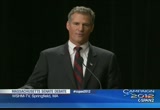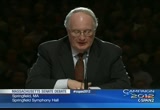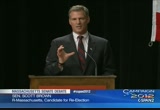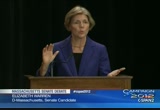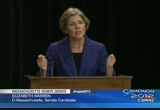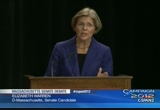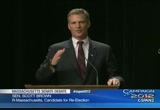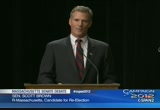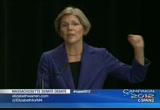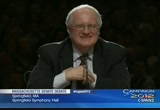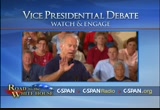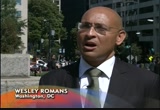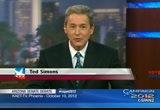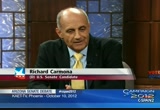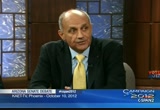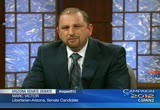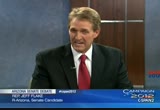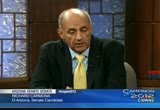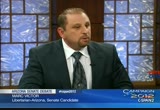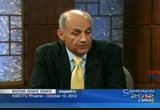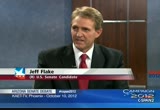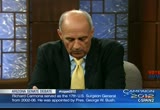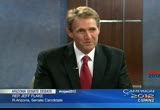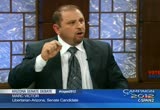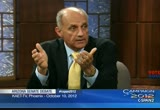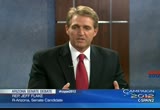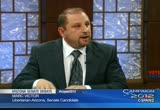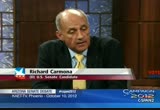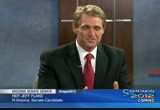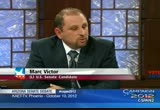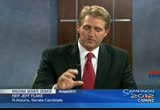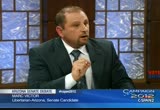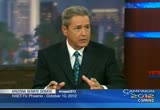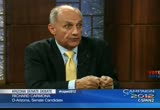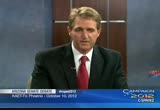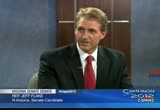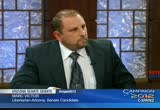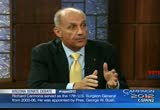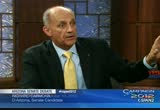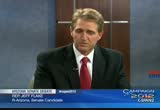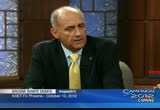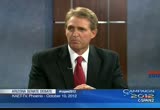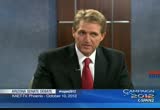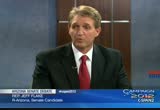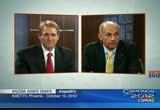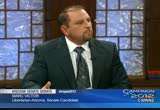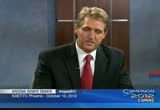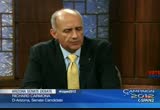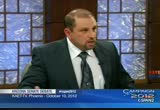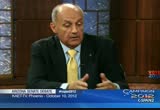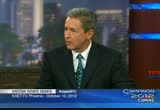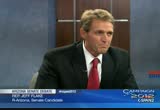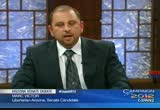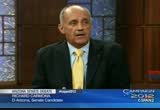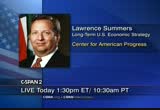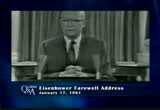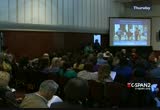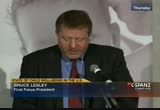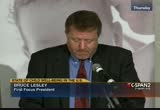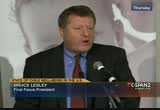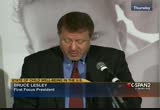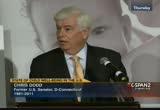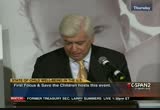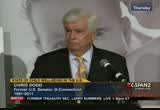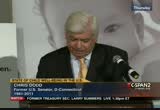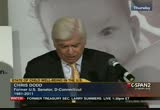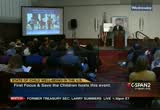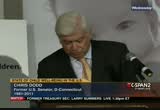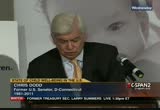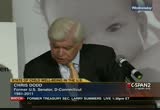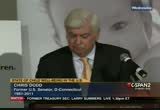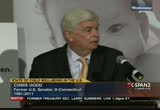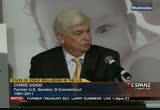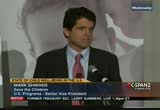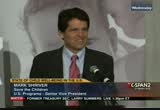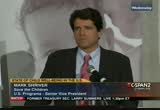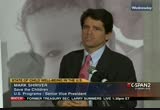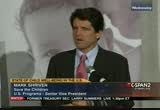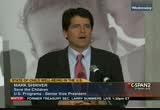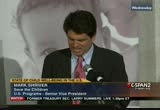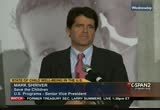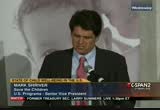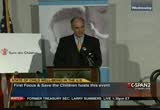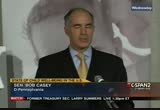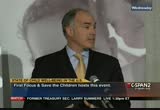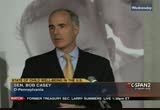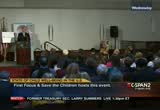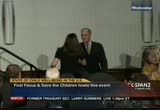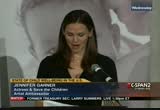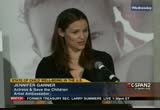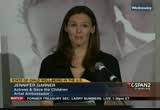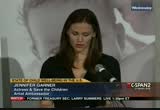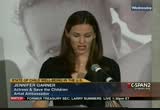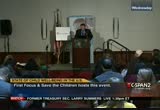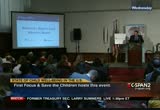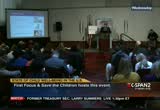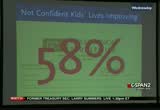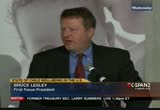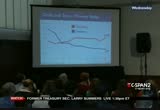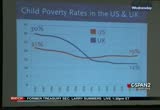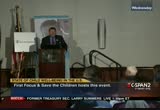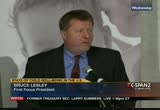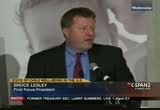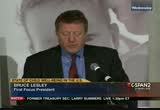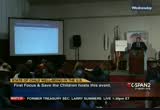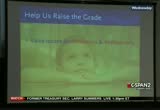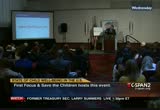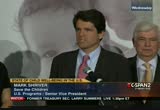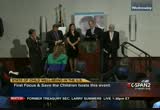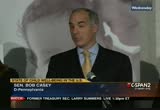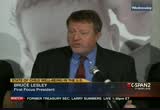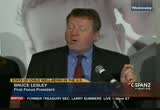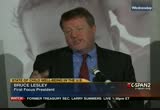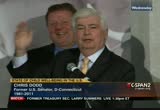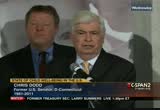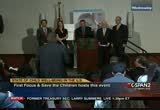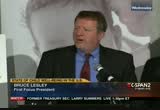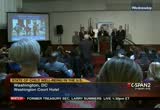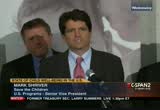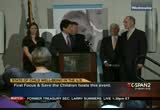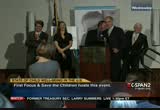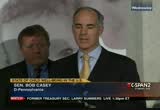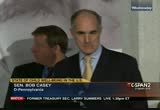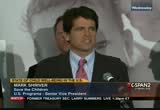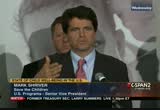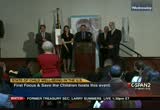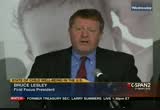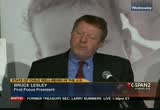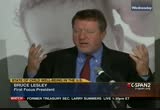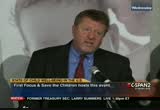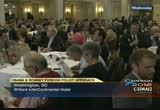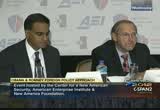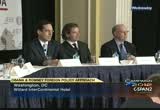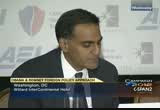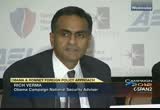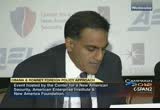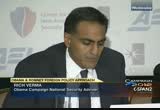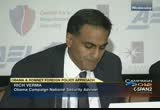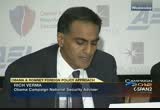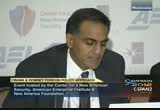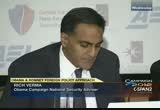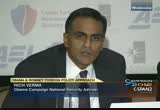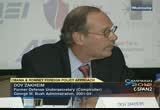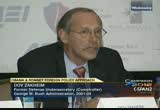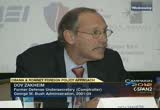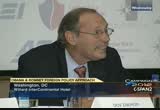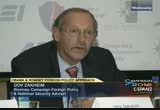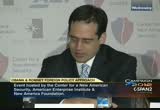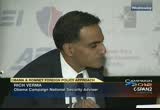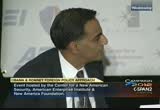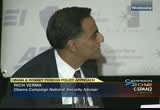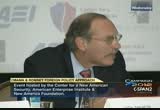tv Today in Washington CSPAN October 11, 2012 6:00am-9:00am EDT
6:59 am
7:00 am
nuclear power and nuclear weapons perhaps that's getting a lot of folks attention. how should we handle the threat of nukes in iran? >> right now there's an embargo and the attempt is to prevent the a range of giving sub strings to enrich uranium. neptune which method and the weaponizing then they need the weaponization. best estimates are six months may be a year. if you're israel your work. if you're the rest of the world you worry. if we can get china and russia to cooperate with to make that embargo really hurt but there are some substrates giving him. we need to do everything we can to prevent them from getting a nuclear capability. the problem is if they do it's not just the threat to israel it's a threat to the whole world because we have an extremist group with a nuclear capability. that would be a point where we have to act to present them from happening spend we have the resources? we can't do it if we want but we had a couple of wars -- >> with two wars, we are broke.
7:01 am
we have the debt up to the level of our gdp. it's something we don't want to do but to protect our nation and to make sure that extremists don't have nuclear capability we might have to act. >> all options have to remain on the table. we don't -- what we don't have to go there but all options remain on the table. >> and that's every option. all right. >> one second. back to iraq. this is why, before we send troops around the world for things like iraq, congress is supposed to declare war. they didn't declare war. that should've been a debate in the congress rather than sit there and get hoodwinked by the administration. now almost 4000-servicemen dead. congress should have a series debate before the send troops abroad. the situation with iran, of course america has a right, an obligation to defend its citizens. if there's a real threat over there, and they're very well may be, if that threat becomes imminent we have an obligation to act to protect our people. but i'm not going to get hoodwinked. i'm going to be a lot slower on
7:02 am
the trigger to go after a country like iraq and that really didn't have any capabilities. >> all right. obviously, the campaign is for the united states senate. the filibuster has been used in this current united states senate all a long. hasn't been accused? >> i think every party will always see the other party abuses. i like the system. i like the requirement because to get 60 votes. requires working across the aisle. i think that's something i'm well-suited for. so i would not vote to get rid of the filibuster. sometimes it is abused by both parties. >> from 1917-1970, 50 cloture vote. this current senate, 109th cloture vote. what is going on? >> you have a dysfunctional senate. we haven't had a budget passed innocent in more than three years but someone mentioned the other day the last time the senate passed the budget, the apple ipad had not been invented yet. >> how can it be functional is
7:03 am
the filibuster is always wearing its had? >> they can. we've had the filibuster for years and with a functional senate. as senator mccain said the other day this is the first time in 51 years that the senate hasn't passed a defense authorization bill. the problem right now, i don't think we will convince harry reid to change -- >> but the beauty and election you don't have to convince. you just have to replace. that's why we made a republican majority. >> given the people have in congress right now i would rather see gridlock than then getting to the kind of crazy ideas putting us more in debt just like raising the debt ceiling. you know it's coming again. you know congressman flake is going to vote for. maybe this time, maybe i stand corrected, it appears only. he votes for raising the debt ceiling when there's republican president. a rather than have these people and their content to march is done the same road we been marching down, we are better off with gridlock. we need to change hearts and
7:04 am
minds. >> we gotcha. i want to know your opinion on the filibuster. is it being abused? should be done away with? it is not in the constitution. >> it absolutely is being abused spent do you think you think is probably? >> it is not being used properly. >> before we go, just a couple of quick question. are you a member of the tea party? >> no. >> you agree with tea party principles see? some. >> are you proud to be backed by the tea party? >> you bet. >> dr. carmona, we heard in times and apache been difficult to deal with, difficult to get along with. your temperament has been questioned but how do the response to? i've had tough jobs. when i was asked to come to run the county health system you have to make some decisions. the board wanted to say the hospital that was going under. we did say the hospital. i've had tough positions at my life and sometimes leadership requires you to take those tough decisions. every one of these issues that come up, of course when i was
7:05 am
begged to be surgeon general, i went through senate confirmation. they were all looked at and effect as i got unanimous senate confirmation a surgeon general so i think the senate premature there was no merit in any of those allegations. >> and would be able to cooperate with others innocent because there's some question as to whether not it's my way or the highway kind of situation. >> it appears that way in the senate right now if we look of both parties. the fact is a surgeon general of the united states i got things done because i s able to work both sides of the aisle. i worked one of the most conservative president in history, president george bush. i worked with the democrats are it will i work with republicans on issues of health, safety and security of the nation. >> did you sign a grover norquist no tax pledge of? >> no. >> would you sign such a pledge of? >> no. >> why? >> because i say the only pledge i sign is a pledge to sign no more pledges. we've got to ensure that we go back and represent our constituents in a way that i believe in limited government,
7:06 am
economic freedom from individuals wanted billy. i don't want higher taxes but no more pledges. >> we have to stop it right there. each candidate will not give a one minute closing statement, and going in reverse order of the opening statements we start with jeff flake. >> thank you all. this been a great debate. the hallmark of this country has always been that the next generation will have a better than the previous generation. that's certainly the hallmark of arizona where the beauty of the sunset is only eclipsed by the splendor of the sunrise the next day. we've got to ensure that we have somebody who understands the proper role of the federal government, and is there to establish a tax and firm and a regulatory environment where businesses can flourish. but it doesn't do much more. right now we have a federal government that is far too large, $16 trillion of debt, $1.3 trillion deficit. we need somebody who will stand up and fight.
7:07 am
i have that record in the house. that's the record i will take to the senate. that's what i would appreciate your vote, and thank you. >> our next closing statement is from marc victor. >> ladies and gentlemen, our country was founded upon freedom. we are about individual rights and responsibilities. we are about free markets. we are about being free to both defined and pursue your own happiness. it's about americans being in charge of themselves. these are the principles that made us a great nation, but we have strayed so far from these principles. we have a busybody government that is into everything. it regulates, taxes everything and everyone literally to death. it's involved in our lives cradle-to-grave. over 16 trillion in debt now and going ever higher. highest incarceration rate in the world. over 2 million in prison. perpetual wars that we keep paying for with more debt and human life. we are speaking in the wrong
7:08 am
direction. and guess who was driving? it's the republicans and democrats. if you like your things are going, don't vote for me. >> that's one minute. our final closing statement is from richard carmona spent thanks very much. i appreciate the opportunity to be with you. you've heard debate tonight with a lot of different issues, and, obviously, we have to get are spending in check. we also absolutely need to look at how we can affect economic growth. but what i'm running for, i want to make sure that every kid has an opportunity to appreciate the american dream, just like i did. the fact of the matter is congress is broken now. congressman flake has been there for a dozen years. it hasn't gotten any better. we still have communities that are struggling right here in arizona. people of reached out to me and said when you're a senator you need help us. this is marketing is killing us. it's not about earmarks, not about pork. it's about us having an
7:09 am
infrastructure an opportunity. i'm not going to run to be worried about getting elected are keeping a party in power. i want to run because the want to go there and change washington and make sure that we're been infrastructure opportunity for all those kids who want to move forward. >> thank you very much, and thank you all. thank you for watching the special the 2012 debate featuring candidates for arizona's open seats in the united states and to be sure to join us next week for debate between the candidates running for congress in arizona to congressional district nine. thursday october 18 on arizona horizon to for more election resources and to replay this and other arizona horizon debates be sure to visit our vote 2012 website at azpbs.org/vote 2012. that's it for now. thank you so much for joining us. you have the most a great evening.
7:10 am
>> former treasury secretary lawrence summers will be at the center for american progress to talk about the long-term economic outlook. you can watch his remarks live at 1:30 p.m. eastern here on c-span2. >> c-span's campaign 2012 debate of website provides live and on-demand coverage of all the presidential and vice presidential debates and it's the only place where you will see our live coverage of behind the scenes sights and sounds before and after the debates. decided each debate question available as a separate clip where you can search and watch by topic. watch your created clips as well and reach streaming tweets from political reporters and other fewer reactions at c-span's campaign 2012 debate hub. go to c-span.org/debates.
7:11 am
by the military-industrial complex. >> why was that speech so important? it warned of the military-industrial complex which has become a cliché. people been thing much a speech at the moment. but they sure have since been. and he spent much of his presidency making sure the military didn't get out of hand. he was only partially successful. but he kept military spending that study. that was targeted in the 1950s. tremendous pressure. we're grading his own nuclear arsenal, rockets and all that. ike guided his own service, the army. really. in order to have the money to buy missiles. that was not an easy thing to do. military spending and 1950s was 70% of the federal budget. today it's about 25% i think. >> evan thomas on "ike's bluff" sunday on q&a. at eight on c-span. >> a report commissioned by
7:12 am
senator bob casey and former senator chris dodd found disparities in the well being of children in the u.s. the groups first focus and save the children hosted senators casey and dodd yesterday for the release of the report. this is an hour and 15 minutes. >> thank you all for coming here today. joining first focus and save the children to discuss america's report card 2012. i'm bruce leslie, president first focus. we are a national bipartisan advocacy group dedicated to making children's health a priority in federal policy and
7:13 am
budget decisions. i want to thank senator chris dodd and senator bob casey for joining us today. they were the inspiration for this effort. they've also been tireless champion of have our nation's children for years and years to senator dodd in his 36 years on the hill, and i'll talk a little bit about, more about him in a minute, but also them have been great champions for children over the years. i also want to thank our key partner on this, report, save the children and mark shriver for being strong partners in the creation of this whole effort and for everything related to the report. and also jennifer garner here today with us, and would really appreciate that. and for her fantastic work for save the children ever being such a strong advocate for children all our nation's children. across the country. first focus and save the
7:14 am
children could not done this report also without the help of the america's report card advisory board, and with experts across many fields were instrumental in helping to highlight aspects of an american child's life that are so strong as indicators of the well being and chance for a bright future. some of them are here today, and i'll introduce them a little bit later. america's report% from its residents on a state of america's child from june to november 2010 led by senator dodd, then chairman of the a senate subcommittee on children and families. these hearings led to a report that provide a snapshot of the welding of american children based on family economic security, education and child health. and provide policy recommendations to improve the outcomes in these areas. following the release of the state of american child report, senator dodd and senator bob casey called on first focus and translates great patriotic report card to provide a
7:15 am
holistic picture of children's unmet needs in america and policy suggestion on how to meet those needs. so one of the things when we think about this report is we -- i have four kids and i went back to school night, in the past few weeks and i figured out that my kids it created about 300 times a year, with its tests, quizzes, homework assignments, plus all the testing that are required by national policy. so, you know, no child left behind, et cetera. so 300 times we assess kids to you. so what we thought about it was how about how we all as a nation are doing on kids. so what's our report on how we are faring for kids? so this is a chance to turn that around and great ourselves. copies of the report are available, as you all know and also on our website.
7:16 am
our grades are not accessing a particular entity. we're not grading governors legislators are in congo and the mistress in the instead we're grading the nation as a whole so it's society, business, families, communities and how we measure up compare with other nations. this is a call to action that we all must be child advocates and we can't and must do better by our children. i'd like to first introduce senator chris dodd, the inspiration by tying the report. just a few words about him. senator dodd has an amazing 36 year career on capitol hill working, and i'll say this, i think you will agree, working tirelessly to protect the rights, welding and health health of our nation's children in the child advocacy world. when i started he was the go to guy on any issue in any community.
7:17 am
so the children's commend. whether it's child care or child health, child abuse and neglect, education, whatever the issue was, people always used to talk to senator dodd staff first and foremost. in 1983 senator dodd cofounded the first children's caucus. and also from his position as chairman of the children family subcommittee he passed laws related to all the issues i mentioned, child care, family medical leave, education, child health and child abuse prevention. someone to thank senator dodd for all that, but also for inspiring this report, and i turned over to to you. [applause] >> well, good morning, and it's wonderful to see such a great turnout this morning, to be a part of this news of this report card. i'm delighted to be with you. i think very much first focus for their work as well as save the children, that in place to
7:18 am
be associated with for many, many years, and proud of the fact that they are located connecticut as well. we like things local pride, and to bob casey, my former colleague and different from pennsylvania who is just a tremendous job. he said wonderful commitment in history deeply committed to the issue children and families, to the united states congress. so it's an honor to be with them. jennifer, we thank you immensely. you've let your celebrity but also your mind and your commitment to these issues, and we thank you immensely for the work you do. being a mother herself of young children, and i am, despite gray hair here, a father of very young children. i dropped my 11 year old and seven year old in public school in the districts of columbia this morning. i use it so i was the only person i know who got mail from aarp and diaper service. kind of a broad reach. so i'm honored to be in the presence of mark and bob andrews
7:19 am
and jennifer. and thank all of them for the committee's work if you. for the effort that's been put into this particular effort, to giving us as a nation the ability to make judgments, and we do in so many areas. we keep records of how people have adding averages today. this city will be celebrating in a sense its first return to major league baseball finals in washington, and get every morning you can read how players are doing. this morning is already telling have a stock market is doing. within 10 minutes of its opening we have ability to judge how its numbers compared to yesterday and a week ago, a month ago. there are any number of examples how we keep records of how we are doing. are we doing better or are we doing worse? yet we have failed over the years to keep the same kind of calibration about how we're doing over the most important constituency all of us acknowledge and admit, and that is our children. how are they doing in our
7:20 am
country, and howard are they doing compared to others around the world, and that we doing a better job? are we celebrating in of the victories that have been made over the years and improving the quality of life of children? if not why aren't we doing better in certain areas? this is an idea that's been a long time coming to have that once a year, to build a gather together and see how are we doing as a country? i've never met anybody in public or private life who didn't believe the most important issues we face of the country was to see to believe the nation in better shape than when we inherited. that will depend on what happens to the young people coming along who will be a part of this audience one day, standing at the podiums engaged in a meaningful debate in the life of our nation. i begin by thanking all of you, former colleague as i said, and care deeply about this issue. of all the issues, all the issues that i've worked on in my 30s years as a member of the united states senate, 36 in congress, nothing meant more to me as a public official, as a public servant or private kind
7:21 am
of children and their families across this country. from almost the very first day i arrived in the united states cinemark in 30 years ago, i began working on these issues and i appreciate bruce making reference this morning to the fact that 198330 years ago this year another freshman senator from pennsylvania by the name of arlen specter and i formed the children's caucus in united states senate. we began holding hearings all over the country on children's health, on child abuse, afterschool programs. any number of issues that affected children every single day. we didn't have a formal status. we weren't a legitimate committee but we decided to use our offices to come together and try to bring some attention to these issues. orrin hatch and i wrote the first childcare legislation since world war ii. putting some resource to the public government to make it available for working families to be able to have a safe and secure place where their children could be when they went off to work and try to provide
7:22 am
their family needs. after seven years, my colleagues dan coats indiana, kit bond of missouri, ted kennedy and others, were finally able to pass the family and medical leave act back in february 1993 the very first act they did as president is now states, bill clinton signed into law the family and medical leave act. rick santorum and i, pennsylvania, wrote the legislation dealing with -- lamar alexander and i worked on allergy legislation together. premature birth, and the screen, afterschool programs. the point i want to make, i mentioned these names is because it wasn't that long ago that the republicans and democrats worked together on these issues. and it ought to be that way again. this is not a partisan battle. who cares about children is willing to stand up and come together. this ought not be an issue by going blue states and red states, people decided to want to make a difference in the lives of children. so we made a great deal of
7:23 am
progress. at face children and families during those years. and as i prepare to leave the senate after announcing my retirement to 2010, i decide to take a look back on the work that had been done and to determine what would still be needed for children and families to do better. so we held a number of hearings with bob casey played an integral part during that year of 2010 during my last year in the congress, going back and revealing what had occurred children over the years. we found that despite the program that again millions of americans the chance to become a part of the middle-class, one out of every four children in the united states was living in poverty. and even though test scores and school standards had been improving, only about half of fourth, eighth and 12th grades in the country were able to read, do math at the appropriate level. those hearing show that despite the good progress that we have
7:24 am
made, more and more, much more needed to be done for our nations children. so in december of 2010, a month before i left office, i stood behind a podium not unlike this one with mark and bob and bruce to announce the establishment of an annual report card on the state of america's children. that first report card would examine the lives of children in a holistic fashion to determine what areas we need to be doing a better job. a little less than two years later it's a pleasure for me to be back with these dedicated people at save the children save the children and first focus, jennifer garner and others to give america's report card of 2012 to all of you gathered here today. i have lived too marked and two others this morning to go into details i want to just take a moment if i can to talk a little bit about my own personal views on its conclusion at what i think where we need to go.
7:25 am
over the last two decades strong progress has been made in a number of areas related to children's well being. we need to celebrate those victories and those improvements are too often in moments like this which is recite the litany of things that are wrong. except that in better in a number of areas with children and we need to talk about that as well. today, thanks to programs like the children's health insurance program, medicaid, the affordable care act, 90% of children are covered by some form of health insurance. that is great news. that's a vast improvement. education initiatives like the race to the top early education challenge have improved access to early childhood education programs for low-income children in our country. a total of $500 million was awarded to schools in the last few months through this competitive grant program. that is good news and needs to be celebrated. and the overall dropout rates among our nation students have declined slightly.
7:26 am
test scores have risen slightly as well showing improvements in all levels of education. but even with these positive trends the report shows as a nation we need to do more, much more if we're going to have a country that is stronger and children leading better lives. despite a continued economic recovery, families are still feeling the effects of the 2008 financial crisis, stating the obvious your one in five children living below the poverty line. the child poverty rate is the highest level it's been in two decades. states are feeling ever-growing constraints on their budgets. as many of you are as were. despite the general belief that we need to provide for the needs of our children, many of the states of targeted programs, funding cuts that are so vital to the well being of our children. consider this. for the second school year in a row, state funding for preschool programs have been cut by nearly $60 million. and into jamaica for budget shortfalls many states are
7:27 am
scaling back funding for child care assistance programs, despite the benefits these programs provide for millions of america's children. and though we've made progress in reducing the rate of infant mortality, consider this if you will this morning. the united states still ranks 29th in the world in infant deaths among industrialized nations. 29th in terms of infant mortality. regardless of your political persuasion, your ideological beliefs, that statistic alone ought to be a rallying cry for all americans to do a better job seeing that our nation's job have a chance at life as they enter this world. it is up to us to ensure that the challenge that is facing america's children are address. children can't appear on cable talk shows. they can't contribute to political campaigns. they can vote obviously. they can only count on us, and it is our political, if you will, the political discussion that is occurring these days with the loudest voices are
7:28 am
heard in these debates. this november i would ask everybody to be casting a ballot for candidates and for children who will be first i hope in the minds. and after the election no matter who wins or what canada prevails or party does, to see to it that these people are elected to office remain accountable to the promises made during this seat. these are issues that are solvable in our nation. if we choose to but america's children at the forefront of our national agenda, we choose to tackle these issues head-on by investing in our nations youth, we can overcome these challenges. and get not only our children a brighter future they deserve, it will give our country a brighter future that it deserves as well. so i want to thank all of you again for being a part of this, those who helped put this report together, the organizations that have come together. as a lookup in the audience i see a number of people who served on my senate children's committee staff over the years, and i would be remiss if i didn't thank him for the tremendous job they did on half
7:29 am
of them are christian and their families. and begin to you, bob, i think it immensely, the job you are doing. you are going to be a great, great champ of the children. jennifer, we thank you for all your wonderful efforts and being here today to be a part of this. and bruce, for his focus -- first focus is important to mark, my different of i've known almost all his life. and am so proud of the work he does and the work save the children does both international and at home. a great, great organization and a duty proud to be associated with it. with that i would like to present mark shriver to you. thank you, everybody,. [applause] >> good morning. thank you, senator dodd for that kind introduction, and for your fantastic work as user. i think bruce summarized your role on capitol hill over the last 36 years as the cookie-cutter qaeda because a better way of saying it. save the children which is
7:30 am
headquartered in connecticut is so proud that you represent us for so many years. in washington, d.c. but more important represented all kids across this country and really across the world. so thank you very much for coming. thank you, bruce, for putting this all together, the work of first focus is fantastic and we're proud. jennifer has been an ambassador for programs or four years. we met when she was pregnant, about to give birth to her second child, and she has been a relentless thomas there's advocate on behalf of america's kids for the last four years. and dissent an amazing job. we were together last week in seattle, washington. we went out and looked at her programs about an hour outside of seattle. she had been to her programs all across the country, california, seattle, washington state, west virginia where we i choose toward our programs as a result of her advocacy with now senator mentioned by then governor mansion and has been absolutely
7:31 am
fantastic. i get to introduce sender casey stemper and all of saying nice things about you for compliments. that's okay, right? okay. all right. just a couple quick words. the center mentioned about save the children. we are working well known for work internationally and about 130 countries around the world. here in the united states were restarted almost 80 years ago as a program focused in kentucky helping kids affected by depression come we're now working in over 200 schools with her in school afterschool and summer literacy programs in about 130, 140 communities on our early steps to school success program, ages zero to five. and the results are fantastic and it's enabled us to go over the last six or seven years, and particularly since the great recession happened, because the results are clear. they are demonstrative. they are showing that kids when they start the program are at
7:32 am
certain levels, and by the income a year later have made strides in the region, almost doubling the number of kids reading at grade level. and almost 70% of kids are showing statistically relevant changes in the region skills which is a fantastic number, given the number of kids that are entering the program prepared to learn. the status of kids in this country today, 16 million kids up, almost 20% of the kids in this country living in poverty. for those kids under the age of five, the poverty rate are even worse, almost 25% of the kids under the age of five are living in poverty. and for many of those kids they are living in extreme poverty. as many of you know, i think it's worth repeating to the press, those first five years of life are crucial. almost 90% of brain growth happens in those first five years, yet public investment are almost flat entelechy of interest kindergarten. when you show that chart to business mentors women around the country, they see it.
7:33 am
brain growth the first five years, public investment almost flat into the first five years of life. it's a huge lost opportunity. so what we want to talk about is -- why we're not making that investment. as we look historically we can see that in the mid 1960s the poverty rate for kids and seniors were just about the same as they are for kids today, about 25% of the kids and seniors living in poverty in 1965. my father, sargent shriver start of the war on poverty under president johnson at that point in time come within 10 years those rates of both dropped down to 15%. the senior rate has continued to drop today. today it has the lowest rate ever, 9% were as kids, the poverty rate for children has continued, unfortunately to go back up to where it is today at almost 23, 24%. and a senator dodd eloquently said the reason for that i think is pretty clear. kids don't vote, they don't have
7:34 am
political action campaigns, they are not on television. they don't have a strong enough voice in washington, d.c. and i think that is absolutely . i just want to talk frequently about one of the issues that's in the report. it's a early childhood. as senator dodd said we've made great progress over the last four years, the home visitation program for new and expecting moms, the live in high-risk communities as part of the affordable care act, senator mentioned the race to the top $2,500,000,000 in 2011. an additional $133 million for the top five or of states in 2012, but the facts remain, even though that is good news, that less than 5% of the kids that are eligible for early head start are getting early head start services in this country today. depending on your number in our report we show that less than 30% of the kids that are eligible for head start are getting the services today.
7:35 am
there's no question that the quality needs to go up in both of those efforts. save the children is now running head start programs in arkansas and will soon be in louisiana to try to put the quality of services delivered by those programs. we need to do a better job in making sure that child care dollars are spent more efficiently and more effectively having an impact on kids. but the bottom line remains that we should talk about whether to cut those programs, but we should talk about making additional investments, to make more eligible kids to get the services, and to increase the quality of the services that are going out there. it's not just me saying that, or first focus and save the children. there are countless other entities. the center for american progress has said that by 2020 china, one of our biggest competitors, plans to enroll 40 million children in preschool which is a 50% increase from today and provide 70% of children with three years of preschool. the united states has no national plan and no efforts, or
7:36 am
now plans to invest in additional dollars in early childhood education. that is outrageous. ben bernanke is called for an increase investment in early childhood education saying the payoffs of early childhood programs can be especially high. for instance, of preschool programs for visitors children have been shown to increase high school graduation rates because high school graduates have higher earnings, pay more taxes are less likely to use public health programs. investing in such programs can pay off, even from the narrow perspective of the state budgets. of course, the returns of the overall economy, to the individuals and themselves are much greater. for nobel prize winner out of university of chicago which is no flaming liberal, organization has said that the most important investment we can make is in early childhood education. as bruce said we're not grading congress but were not grading the administration. we are not grading any particular institution with this report. we are calling upon all
7:37 am
americans to make and to demand more investment from our leaders on the state local and federal level. senator dodd said we believe children are the most important resource. but the bottom line is we don't do it. we don't invest in a kids. so despite the fact that many political leaders say that kids are the most important resource, we don't as a country put our money where our mouth is. that's a national tragedy and it's a national shame. we are hoping that this report will highlight some of the areas we should be investing our dollars in, should not just be bobbing our heads like bobblehead doll to sing kids are most important resource and then do nothing about it. we've been playing that game for too long. one of the guys who does not play that game on capitol hill is senator casey. senator dodd talked about his great work on the health committee. my uncle often talk about the great work that senator casey
7:38 am
was engaged in. he's been one of the stalwart advocates for the children's health insurance program. he's been a strong, strong support of the 21st century fund program that supports efforts like save the children and rural america all across the country. he has joined jennifer, senator mikulski and others to introduce early childhood legislation that unfortunately has not passed because we're not garnered a bipartisan support that made early childhood education a priority that this country needs. senator casey is introduced that legislation, has pushed forward and were hopeful when he gets reelected this fall that he will go back up to capitol hill, continue to push forward. senator bob casey. [applause] >> thank you very much. mark, thank you, and save the children for the support and for your great work over so many years. we're grateful to work with
7:39 am
organizations like save the children and first focus. bruce, thank you for your great work and for getting a report done. when senator dodd and i were talking about having this report on a couple of years ago, once in a while in washington he asked for a poor, you actually get it. so we're grateful for that. chris dodd, i'm so happy to see you again. i saw chris not too long ago but so great, grateful for your work and your leadership. and the police that he brings to these issues, and it's more than a voice of compassion and commitment. that is highly important. you have to have a hard and a commitment. but he's got a long record of achievement, substantial achievement. as you recall some of that work, going on the road literally to make sure that he may children a priority. and i think senator dodd remind us again that meeting the challenges outlined in this report can't be one party. it has to be bipartisan and it has to be public and private.
7:40 am
not one entity, not one part of our society can do this alone. and by reciting some of the history, it reminds us and i think it challenges us to do all we can to bring the parties together. we are so grateful, and jennifer, thank you for your great leadership, helping introduce jennifer. and a couple of minutes. i just want to make a couple of points about the report. this report provides a report card, but i think in large measure provides a measure of accountability. and it's a mirror into which we don't look often enough to reflect upon where we are. a commitment that would make your kids. i've always said that what brings people in this room together, no matter who you are, what brings you in this room is a basic belief that every child is born with a life inside them. for some children that light is so magnificent, they don't need a lot of help because other
7:41 am
circumstances or because of their natural ability. but for some kids they need extra help. that might be early education. that might be hoped that the family can provide with health care, whatever it is. and we've got to make sure come at i think it's the obligation of every public official, every elected official at every level, and appointed officials to do all they can to make sure that the full measure of that light instead of a child is reached. no matter what the full measure of that potential is. and we've got a ways to go before we can say we're doing that. we've made some great progress under the leadership of senator dodd and others, and we got a long way to go on the public side of this but i think the private sector has got to help us as well. i think both parties have an obligation. it was a great line somewhere, scriptures, about a faithful friend, and you've heard this line before. a faithful friend is a sturdy shelter. he who has found one has found a
7:42 am
treasure. and i think when you see the results of a report like this, whether it's a c- or a transient or even a b come into we get to a, i think we will be asking whether or not we are the faithful friends of children that we should be, i think we have to be in order to compete and internationally difficult and challenging economy. but also i think to ask ourselves, isn't it what we should be doing as a nation. a report like this allows us to measure where we are, and also to provide a roadmap so that we can move forward in the future. so i think one of things we can do here in washington, both parties, is to commit ourselves to being a really committed and authentic friend to our children. one of the ways we do that is not simply by focusing on the public policy, the bills, the
7:43 am
legislation, public policy work, but also by partnering with people well beyond washington who bring their voice, bring their passion and commitment to an issue like this. jennifer garner has done that in so many ways. we know her as an actress and artist first and foremost. that's where most of us became aware of her work, but i know her as an advocate. she's a mom, to. we got a letter today that indicates that the commitment of our whole family to these issues, that she might read for us. but i'm so grateful for her work as an advocate. someone who brings an articulate voice, a voice of passion, but also a voice of real commitment to making sure that the grades on this report card go up and that will be a faithful friend to our children. you should be. some honor to introduce someone who's done a lot of work over many years now on these issues, jennifer garner.
7:44 am
[applause] >> thank you so much. tank you for your kind words, senator casey, and for having me here today. i did bring the letter a long. you know, kids do not love, my kids go and i'm sure yours do when i leave town, but my kids really know that when i leave town for save the children i do it with joy and with a sense of purpose, and i try to help them understand and help them, include them in the sense of purpose. and last night, the night before was telling my six year old i'm going to be gone, i'll be back the next night, unicom this is what i'm doing, i'm going to speak with him senators and then i happened to be staying at the cia later today -- [laughter]
7:45 am
and she disappeared for bit and came back with a letter she wrote absolutely on her own. and it says, dear senators and cia -- [laughter] please give my mom the money she wants for save the children. [laughter] it is a really good cause. i appreciate the time you've taken on my letter. sincerely -- [applause] so there's one person that we've got this one taken a. she understands, could. okay, we just have a few other hundreds of millions. so i am thrilled to be here in the midst of people who are committed to strengthening our countries commitment to our kids. i'm particularly honored to have senator dodd with us. senator dodd as i said before, i don't think we could've asked for a strong advocate for our nations children. i walked into a party that already set up for me. i have no doubt that when
7:46 am
hundreds of historians debate the legacy of reserves they will all agree on your dedication to children particularly children in poverty. it's unparalleled and i cannot thank you enough for your leadership. [applause] i also want to thank you -- senator casey, since arriving in washington, d.c. in 2006, senator casey has become one of the fiercest child advocates in congress. he has been a staunch supporter of early childhood education, which is my favorite issue, and it has been a privilege working with you over the past few years, so thank you. [applause] >> as senator casey mention i'm an artist ambassador for save the children programs to i met mark shriver about four years ago, and from her first conversation i knew that save the children was the place for me. i grew up in west virginia, and have seen firsthand the effects
7:47 am
of poverty, died in the the wool kind of resigned to the helplessness poverty that permeates many of the forgotten communities that mark and his team serve. just last week mark and i visited the base in western washington. it is so beautiful up there. it's right on the pacific coast, on the edge of the olympic national park. it's breathtaking. and family are living in these dilapidated trailers with no heat except for a wood burning stove in the middle as their only source of heat, and the children running around and coming very dangerously close. anyone who has a kid walking in front of even your oven, you say watch out, watch out, it's hot. so with a big hot stove in the middle it's no surprise that we met a little boy with burns, blisters all over his hands. because it's a tiny little trailer and he bucked up against it and his hands were burned. of course there were no books or toys anywhere inside except for those brought by save the children, and i wish i could say this was the exception but the
7:48 am
more i travel with mark and save the children the more i see that this is far too familiar, although -- all across the country. the store for kids and for to make it in this country is tragically simple. were not preparing them for school. half of the children in the united states get no early childhood education coming kids living in poverty have heard on average 30 million fewer words spoken to them by the time they are four years old. our kids are falling behind. four-year-olds from families living in poverty, at four years old they are 18 months behind develop mentally. i met a boy last week he was 17 months old and he was about where my seven month old it is, developmentally. that isn't an exaggeration to my seven month old is not a genius. he's just a baby but he is babbling and curious and he's engaging in a way that all of your babies to come and a 17 -month-old was just starting to get there. it's shocking. it's shocking to see. as a result, america is falling
7:49 am
behind. this story is not a new and, especially to those of you into the advocate for kids at each and every day. you know this all too well. you also know that we need leaders, and no one has been a stronger voice for children and chris dodd. prior to his departure from congress, senator dodd called upon save the children and transport to evaluate and grade the country on key issues affecting children including education, health and economic stability. after nearly two years of research and evaluation, these organizations produce an actual piece of work. this report card shows that we, the wealthiest nation in the world are not meeting our obligations to the future. there's so much work that is needed and at times it seems overwhelming. it's not great news but there is so. there is no. over the last few years under the leadership of both senators dodd and casey, the obama administration and congress have provided new key investment in
7:50 am
early learning and children's health programs, including the $500 million fo for the race toe top early learning challenge act fund, over $3 billion in new early head start and early head start and head start funding, and nearly $33 billion in new funds for the childress health insurance program, which also expanded coverage to 4 million new children. simply put, strong investments in education and health for the next generation are essential to ensuring the economic prosperity and security of america. and deeper investment, particularly and early childhood education means something their personal to me, and not just because i have about 50 little kids at my house. at least that's what it feels like. these investments are fundamental to breaking the cycle of poverty in places like when all to washington and places like my home state of west virginia. actually all over the country. where poverty has gripped families for generations. today nearly one in four
7:51 am
children live in poverty in america. inequality is the highest it's been in a generation. and now more than ever children need strong, dedicated advocates like you to be their voice. and that's why i'm proud to be here today with mark andrews, our friends from the senate, and i'll get to unveil this crucial report. to me it isn't just about investing. it's about making america an even stronger more competitive and more just nation. that is the most important action we can undertake. thank you very much. [applause] >> so i'm going to walk through some of the findings of the port pretty quickly and then we will
7:52 am
take some questions. so first of all, what we did was we broke the report into five domains. so what we have here is economic security, early childhood, k-12 education, permanent stability, and health and safety. these areas were chosen because they provide the strongest indicators of child well being, being each of the five primary areas, there are more specific categories and you can find those in the report. in doing the report i will give you real quickly that there was some great resources that we used that already tracked the well being of children, the foundation for child development, child loving index and children's defense funds, the state of america's children series. this report complements these existing resources while we use many of the same data as these other materials, america's report card is unique because it assigns grades for each aspect of child well being an overall
7:53 am
grade of how children are faring in the united states. also just wanted to briefly think also the advisory boards, people who are national experts that we called him. and you can see their, we cited them in the report. they were very helpful, thinking about and by defining the best indicators. can you please stand up through briefly? dennis is here, and who else? thank you both. thank you all very much. [applause] >> dennis johnson is from the children's health fund and mary is from the national education association, who also just had a new baby. what we have here is sort of a mixed bag, and people talked about that. some indicators were doing very well by kids. so we talked about and we are very close to the finish line on children's health coverage.
7:54 am
with the work between medicaid, the passage of the childress health insurance program, and extension of the children's health insurance program, we have less than 10% of our nation's kids lack health insurance today. a profound improvement. other areas where making strides, people talk about the race to the top funds and the efforts of early childhood, where we've made enormous strides but still have a ways to go. and in other areas we feel strongly that we are really selling to prioritize kids and have a lot of work to be. we are in football season, some places where near the finish line. someplace where kind of at midfield and some places we are just starting out. so one thing i wanted to cite is we did a poll recently with public opinion strategies and we asked the american public, what do you all think of children are faring. what we found was some interesting data with respect to
7:55 am
kids to one is that the american public almost by a three to one margin believe that in the last 10 years the lives of kids have gotten worse. and they also are not confident that this generation of kids will not fare better than this current generation. and so i think that sort of a unique point in history in our country is that we've profound in this country believe in the american dream which is every generation builds off the past generation and for him majority of americans today, that belief and the next generation will do better is being shaken. i think the american public has spoken on it, and there are profoundly concerned about the well being of kids and the next generation. so any area of economic security we talked a little bit, talked about this but we have 22% of our nation's kids, more than 15, are living in poverty. 8.5 million kids are living in
7:56 am
secured homes. is 1 million kids in the country are homeless, and but there are some positives so we do know that there is an income tax credit and child tax credit with five make it out of poverty. so those programs are key to making sure that this problem does not get worse. and something to note is that the earning income tax. or and the child tax cut that are up for extension at the end of this year. so things are definitely, appearing right in front of us that we need to work on immediately. with respect to child and senior poverty rates, i think there's also a lesson. senator dodd spoke to this, and jennifer carter, and what we need to do but this. which you can see in 1966, the poverty rate for seniors was much higher than that for kids.
7:57 am
and with a lot of focus and a lot of work of mark, mark shriver's dad and other people, we have tackled some of these problems. you can see the poverty rate for seniors, and mark talked about this, is now down to 9%. the poverty rate forget is going back up. what we're calling on a is sort of a focus, focus take us -- particularly on child poverty. in great britain, the blair administration in 1999 decided to tackle child poverty rates. and you can see that their poverty rate when he addressed the issue was much higher than the united states. and you can see that it has all but the other thing that's interesting about this, if you go forward, this runs only through 2007, but if you go to forward we know the poverty rate in the united states has gone up to 22, 23%. the poverty rate for the uk is still down at 12. poverty rate today in uk is
7:58 am
about half that of the united states, despite having started off with a high rate. so it can be done. on early childhood of a talk too much about this because often, speakers about this before me talked about this, but you to highlight a few things. head start reaches less than a third of eligible kids. early head start only reaches 4.5% of our nation's kids. and child care funding reaches only one in six eligible parents. so we have the systems in place. we have not provided the adequate resources to get kids where they need to be. in education, look, my kids go to some of the best public schools in america. my parents were both former teachers. and i think that the american education system, in places is incredibly strong and needs to be supported. but what we know is there still racial disparities, that we need to work on. we have enormous differences in how we fund schools in this
7:59 am
country. if you look in texas, for example, there's a three or four to one ratio, the highest, the wealthiest schools in the state get and what support schools get. we also know that 43% of title i schools are still unfunded, and one in six americans are not in school working. i will note that we are failing kids in texas -- texas has for example, in the last decade, the growth in the number of kids in this country, texas has 50% of the. went to texas do last year? they cut education spending by over $5 billion. so my parents live in texas. i know this. schools in texas have over 40 kids in the classroom. that's not a success. there's school systems that have completely eliminated extracurricular activities, no sports, no debates, no drama, no our clubs, because of the lack
8:00 am
of funding. and that's something as a nation we must address. i won't go into this for lack of time, but you see we so disparities and dropout rates and we must work on. although this is a success story and that those numbers are declining. we are moving in the right direction. but it combines the issues of child welfare, abuse and neglect, immigration, policy and also juvenile justice. u..
8:01 am
>> really tirelessly on is the issue of how immigration policy, foreign policy and child welfare policy don't work together. so we may have an immigration policy where we do removal of parents, but sometimes neglecting what happens to the kids. there's a report that came out that over 100,000 parents had been deported at some point. we have no idea what happens to the children in those countries. so that's an issue, um, that we really, we really need to pay attention to and tackle. so, again, a positive story is
8:02 am
that the number of kids in foster care's declining, so we are doing a better job of trying to get at the issues for kids early. and, again, we need to really move to this more comprehensive measure of child well being when it comes to child welfare issues. and last, and this is sort of a good news/bad news story in and of itself, health and safety. one of the great things, an enormous success story s the passage of the children's health insurance program and the decline of uninsured kids many this country. we asked people this question in nevada, and this is a story the american public doesn't really yet know. we asked the focus group what percentage of kids do you think are insured, and every single person in the group thought less than 60% of the kids in the nation had health insurance. but the fact of the matter is the real number's over 90%. so we've done -- this is an enormous success story, and that story is not understood well by
8:03 am
the american public. on the other hand, access problems mean coverage don't always translate to care, and we know that. a lot of work to do in terms of access to care. and dennis johnson, who was from children's health fund, it's something they work tirelessly on in terms of trying to improve not only the coverage, but the access to care. we also know we've made public health progress with immunization rates and things like that in this country. one area that is also a little bit of a problem, um, back to the public health issue, we also know there's a childhood obesity epidemic in this country, so a mixed story there and public health. and then on the environmental health side, we know about the asthma issues in this country, and that's really highlighted in the report about those issues. um, so again, here's the story of the passage of the children's health insurance program in 1997. and kind of the major decline in the number of uninsured kids in this country.
8:04 am
some aspects to the poll, we also, we know that, for example, the percentage of the budget -- kids represent a quarter of the population, but yet only represent about 8% of the federal budget, so we asked the public what percentage of the budget do you think that kids should get, and what voters said was that it should be 28%. so the american public believes that kids should get about their share of the population, if not a little more. and instead what we have is an enormous gap. and last, um, we asked voters a question about do you think that candidates for office should pay more attention or less attention to children, and almost two-thirds said that they believe we could be paying more -- we should be paying more attention and 82% of voters said how candidates address kids will make a difference in how they vote. so how do we address this?
8:05 am
one thing is to continue to raise awareness around these issue, and we've been working with save the children and others on the social media strategy around awareness and so hash tags we're using on twitter a lot of kids 2012 and talk poverty. but also senator dodd spoke to this about holding policymakers accountable. so we need to ask them the questions. i hope in these debates someone asks the question about how kids are faring in this country. and no matter who wins or loses, we need to hold policymakers accountable and get these issues in front of people. all of you in the room, i see many familiar people who do exactly that, and we need to continue to build this set of people across the country to really keep this issue first and fore post in people's mind. fore post in people's mind. so getting involved. you can download the report on our web site and i believe also
8:06 am
on the save the children web site. also one quick shout out. i want to thank cara and kevin for all the hours and hours and hours and hours of work on this and jessica newman as well for doing all the research, um, on this and talking to many of you out there on these issues and, again, our advisory board and all the people and staff at save the children for all their work on this as well. so thank you, and at this point i think we're happy to take some questions from the audience, and if you guys want to come up and -- >> i guess the only last point i would make, bruce, that i forgot to make, senator dodd just whispered it in my ear, is in the last presidential debate, there was not one question on poverty. and i just think again as the vice presidential debate
8:07 am
happened and the next two presidential debates, we ought to have at least one question on kids and poverty in this country. and i hope that the hash tag that was just put out there will help folks at home or anybody in this room try to get that message out. because it's really a national disgrace that we have almost 25% of the kids in this country live anything poverty, and it never is doesed in the presidential campaigns. -- discussed in the presidential campaigns. questions? >> hi. thanks so much -- [inaudible] i'm with the associate -- [inaudible] i'm wondering if you'll talk about messaging -- [inaudible] devastated a lot of these programs and second of all, how do we get -- [inaudible]
8:08 am
>> well, let me just say in terms of the, in terms of sequestration and what we're facing, one of the messages i think from both parties is that we've got to come together to get an agreement that avoids the imposition of sequestration because it's -- by definition it's an arbitrary, across-the-board cut which would be devastating for the economy. in defense programs and in nondefense. and i think that message is starting to get out, and i think we'll get an agreement to avoid that. but in the process of doing that, we have to identify prior theties, we have to identify -- priorities, we have to identify values. now, fortunately in the agreement in 2011 there were programs exempted like medicaid, and that was the right decision. but even, even with certain exemptions we've got to make sure, first and foremost, we avoid the imposition of
8:09 am
sequestration, but beyond that we're going to have some difficult debates about what happens after that when we start to deal with the larger debt issues. but i think we can avoid in a bipartisan way the impact 06 sequestration and that would, of course, be good for the economy, but it would also be good for kids. >> on that, also, i want to point out what the public thinks about the this. we asked this question of the public about do you think the deficit is a concern of yours, and 91% of americans said, yes, it is absolutely a concern. and all we said is what are your priorities then. so we asked a series of questions about what would you cut and what do you think is eligible, you know, should be eligible for cuts. one of the great things about this poll was that the american public say this is about, basically, what they come out with is this is about priorities and choices. and so when asked do you care about the deficit, do you think that education, early childhood,
8:10 am
child care, head start, medicaid, student loans, child abuse and neglect funding, prevention funding, do you think those things should be cut, and on every single question overwhelmingly the american people said not on kids, not on the backs of kids. and so, yes, we should tackle the deficit. and actually the deficit can be seen very much so as a children's issue because they will be paying back, but the fact is people believe we need to be making an investment o that that generation is strong and can fulfill their god-given potential. very strong, and it's bipartisan. democrats, republicans unanimously believe. i will also point out we even asked people who were tea party supporters. on five of the seven measures, the vast majority of tea party supporters opposed cutting children's programs. so two areas where we need to do
8:11 am
a little bit of work with them is on head start and on student loans. but on child health medicaid, other issues, they opposed making cuts to children's programs. you have a question? >> morning. i'm bill o'hare, used to work on the kids count project. so i have a special place in my heart for any report that has data in it and i appreciate your efforts and actually have a two-part question if i could. any plan about replicating this in the future in terms of producing it yearly, biyearly, and second, any plans to take the report card down to the state or even local level? >> um, i would say we're still talking about them. i mean, it is a lot of, it is a lot of work, and so we're trying to figure out, we'd like to do it, um, again shortly and certainly think about doing
8:12 am
state-by-state level. but one of the things that's really great is the annie casey foundation, and i know you've held a lot of -- led a lot of the work on kids count, does do that. so trying to figure out how this fits in with that is important, but we do believe this is an important yardstick using those data sources and all the work that has already been done. so we don't intend to duplicate, we tend to be additive and sort of thinking through that and working with any of you in this room about how what's best in doing so. >> well, i would hope it would be. just again, on a personal level, i think the value of this is that you, you know, we all grew up in communities and know how important it is for a community to know how they're doing. the old thermometer in town, i guess, gray hair -- you look like you might remember the old thermometer in town. you'd go by, and the chamber of
8:13 am
commerce in the community would run that big thermometer whatever the community goal was that year. you could drive by, and they'd be running that red line up. and i think it's important to have templates. we have concernses and reports, and -- conferences and reports, and it can glade the eyes of even the most determined listener. if we don't have some standard, as i said earlier, we get weather reports every day that tell us how we're doing. why can't we find some way to measure how our children are doing? so we have some sense on a yearly or biannual basis on how are children's issues being addressed, on education, on security and the like. so we have a way of measuring that and giving the opportunity to those at the local, state and national level to be able to respond to those. what are the priorities. we're doing better on some of those issues. i think that's so important in a
8:14 am
debate to be able to understand how we're doing as a nation when it comes to this critical issue. again, i know these are big decisions to make and resources are scarce, but if you really want to get behind something that's worthwhile, i believe having this kind of a measurement on some, with some regularity, i think, would be a great asset in terms of moving the ball forward on all the issues that we talk about year in and year out. so whatever it's worth -- >> go ahead, turn me down. [laughter] >> um, hello, i'm reid mackey with the child labor coalition, and i just wanted to mention that there is a pocket of vulnerable children called migrant farm worker children who work 12-hour days in 100-degree heat in grave peril, and it hampers their education. i want to thank bruce for his
8:15 am
leadership in helping this population, and we could really use some help in congress to equalize the child labor laws in the u.s. so that these kids are not discriminated against. if anybody has any comments on how we could help this particular population of, you know, largely immigrant kids but not exclusively, that'd be great. thank you. >> um, on the, on child labor that's definitely an issue that we are focused on at first focus, and in the -- and we talked a little bit about it in the report. and, absolutely. again, i think one of the key things i think this report really highlights and really reinforced for us is the issues for kids are not very sector, like, we can't just care about a kid's education, we have to care about their health care. and that's exactly as you said. for these kids they're working in conditions that we need to, we need to address with our
8:16 am
child labor laws. we also need to make sure that the education and health care issues for those kids are addressed appropriately. many of them are uninsured, some have different immigration status, the immigration also plays into this. so a lot of different issues that we really need to think about as a country and make sure we're deal with the whole child and their whole well being, not just, you know, on the very specific sectors. huge issue that deserves more attention. >> good morning. i'm marty scherr, i'm with the campaign for u.s. ratification of the crc, convention on the rights of the child, and i know we have a number of active, long-term supporters of it here. i see this report as dovetailing beautifully with the unicef report on state of the world's children. what really concerns me is something that was mentioned earlier, and that is where we stand in face of the rest of the
8:17 am
world. and that's -- it kind of speaks to our credibility as a nation when we try to talk about how wonderful the united states is. and i just wonder, one, if anyone would make any comment on the crc and, two, on whether, whether this really matters, whether where we stand in face of the rest of the world is something that this is aimed at helping with. thanks. >> mark? >> i think to the last question you asked is does this really matter, i think the answer is, yes. i mean, i don't know how it can't matter. i think that, you know, when i'm listening to bruce talk about the public opinion, um, talk about the numbers of folks that are in favor of investing in kids and yet our political leadership doesn't do anything about it really begs the question, why not?
8:18 am
i mean, the answer to your question is emphatically yes. but the problem is that we don't somehow have enough political juice, frankly, those of us who are advocates in this room and have been pushing the issue, we don't have enough political juice to get through to the political leadership in this country or in many states. and that's the situation we're in. you've got to call a spade a spade here. so i think we've got to get involved in the political process. i mean, democracy is messy, and the squeaky wheel gets greased as we often hear when i'm out in state governments. and the bottom line is, you know, folks have got to raise money, and they've got to get politically engaged, and taye got to get poor people engaged in this progress, or else we're not going to make any progress on any of these issues. and it can be really discouraging at times. it can also be encouraging because we've made progress, but we need to do more and to do better. because kids just don't have the
8:19 am
resources to get that message out. >> thank you, i'm janie with the american academy of pediatrics. thank you all for the work you do on behalf of our nation's children. a couple of questions, groups in the room and folks that care for children, if there's one or two things that you could recommend, senators or bruce or anyone on the stage, between what we can do between now and the election to help influence congress on sequestration cuts and other issues that policy wise are tied with some of the data in this report, i would love to take that charge back to the nation's pediatricians. and secondly, i have here with me the child care advocate, it's a flat stanley kind of campaign we're taking, i'd love, also, if you're willing to get a photo that we can share with all of you and our little carr hi
8:20 am
figure before the -- charlie before the end of the day. that's my shameless plug. >> very good question. not by way of a recommendation because i don't want to tell you how to do your work as an advocate, you know how to do it. but i do think in the context of an election but even beyond the election but maybe especially because candidates are asked questions and are held to account this is an ideal time to raise these issues, number one. number two is from my vantage point when i look at my home state of pennsylvania, we made great advancements in the 1990s on children's health insurance. made tremendous advancements later on early education. but it couldn't just simply be a public policy or elected officials priority. the reason why we made progress was because there were those partnerships. one of the most significant partnerships that were developed
8:21 am
there and i think around the country and first focus and save the children could speak to this more directly is the business community. some of the most passionate advocates for investing in early learning, investing in children's health insurance are business leaders. and not just a couple, but ceo afcee owe saying conclude that they understand not just the gravity of the problem, but also what it means for the economic bottom line. so the more that we can link this appropriately to jobs and the economy and future economic growth, the better because that engages a lot of folks who may not, may not as part of their daily work be a child advocate or be an advocate for one or the other issue. but linking it to economic growth, gross national product, whatever measuring, whatever measurement you use about the economy, i think more and more that's happening. and ceos, i think, in the last -- at least in my experience in the last 15 years -- have become one of the
8:22 am
greatest champions of this. >> get engaged at perhaps the policy level. how in your work, um, have you seen students be engaged in dealing with these issues, if at all, ask maybe ms. garner as well -- >> i don't understand the -- how -- >> how do you think students and children being engaged in kind of combating these issues that are affecting them? >> well, kids growing up in poverty don't necessarily know that they are. by the time they hit school, they're already so far behind that they're starting off on their heels instead of forward. and they're starting off without pride and without excitement and with -- in kindergarten when you see kids who are ashamed and
8:23 am
scared to be there, that is a problem. they don't know, many of them have never held a book before, so they don't know how to turn the pages, they don't know what print is. there's one book for every 13 kids in these communities instead of on average for our kids, you know, 13 books for each child. so how to get kids involved or how they are involved is just by being there for them and giving them the leg up that they need. and kids growing up in a more prosperous household, i don't know how we, you know, how we involve them, that's not something ha i've worked on. >> i think, you know, if you look at the example of the recycling movement in this country, that started really from schools and kids, you know, essentially shaming their parents into doing recycling. [laughter] again, call a spade a spade. you know, and you see that happens on that issue. so if you're writing in
8:24 am
education week and you can get teachers to get their kids, their classrooms engaged, you see so much on change.org, you see the impact on the lorax film started because kids got involved and wanted that message of environmentalism incorporated in the film. so there are a number of examples of change happening from kids pulling their parents forward. and i think if you can encourage teachers, principals, school systems to get their kids to understand that almost one in four kids in this country lives in poverty, that's a stunning statistic. and i bet if that message gets out, kids will want to do something about it. whether it's adopting a school, whether it's doing a book drive, a money drive for schools, you know, kids are doing that type of stuff all across the country. but, you know, to answer one to have questions earlier, we don't have a big enough platform to get that message out. save the children, first focus,
8:25 am
don't speak to thousands of school teachers in the country. so you ought to tell them there's almost one in four kids live anything poverty through your publication, challenge them to get involved just like businesses are doing including pnc in pennsylvania on the early education issue. that's a different person leading that charge than, you know, somebody like me who's kind of a normal advocate, if you will. but if you have a businessman or kids leading the charge -- politicians listen to children, right? yeah. [laughter] a good photo op to be with kids. so why don't you get those kids and teachers to read education week. >> i think we have time for one more question. >> lucky me, i guess. my name's teen ma mccarter, and i'm with the u.s. department of labor's office of child labor, forced labor and human trafficking, so picking up on the issue, focused on both market and international --
8:26 am
national and international child labor. my question is a bit technical. we, this year for the fist time, we published a report, but we tried to assess how other governments are doing in combating child labor, so i'm very curious to know a little bit more about how you came one the grade and the grading system in the report card. and i guess a specific question that i had was you had sort of various indicators, did you, um, weight each of those sort of similarly? and then what was your process for coming up with sort of the final grade? >> um, so what we did is first focus and save the children we, first of all, we used the report that senator dodd put out in 2010. and used the annie casey foundation, kids count data and the foundation for child development, child well being index and other measures and also, you know, from the various
8:27 am
agencies, their data as well. so looking at that as a base, we also looked at the unicef numbers and looked at sort of tried to do as much as possible, it's very difficult to do cross-country comparisons. and then based on that really think about what, you know, kind of looking at kind of the way the u.k. did it, right? they developed a child poverty target and said we should be able to cut the child poverty rate in of half in ten years. and they succeeded. today did succeed at this -- they did succeed at this. so think about that, where should we be. and so is it okay, as senator dodd pointed out, that we're 29th in the world in infant mortality? i don't think there's a single person here that would think that's okay. so as we looked at those kinds of measures and thought about those things and worked with our advisory committee, one of the things we really did rely on them a lot about what is the data, what is that saying and where should we be as a nation. that was sort of the yardstick
8:28 am
we measured, so that's -- we gave a very poor grade on infant mortality and how we're faring as a country by kids. on the other hand, um, the numbers on chirp's health insurance coverage -- children's health insurance coverage, we made enormous progress. so we gave an a-. if you look at some of the conditions of the affordable care act, so whether you like it or not, um, some of the provisions are very key for kids' coverage. and so there was the extension of the children's health insurance program that senator casey was a huge leader on. there was provisions around and mark talked about the home visiting programs, there's express lane eligibility to get technical, but it allows for data transfers between programs so we can make sure that kids who are eligible but not enrolled get covered. so a lot of those kinds of things. we felt like we were very close there. so kind of doing a full
8:29 am
assessment. and so in domains we came up with grades and sort of created an overall grade within the domain. and then for the overall grade, frankly, it was just sort of a gut. you know, how do we think we're doing as a nation based on all this data that we have. and the feeling was, you know, there's some good things, some little things, but particularly because of the economic security initiative that 22% of the kids in this country are live anything poverty and just the profound feeling that that's not okay, we felt that a c sort of an average, we felt at this point in time we're not doing -- we're kind of near average, but we could do be doing a lot better, so c- became the -- it was a very consensus process. again, it's not science. the data underlying it is the science. but it was really trying to create a yardstick.
8:30 am
and the great thing here is forward it's an easier thing to measure, right in we reduce the child poverty rate dramatically, then you start moving -- then we're talking about bs and other grades. so it's a yardstick as senator dodd spoke. >> thank you. >> thank you all. [applause] >> look at what president obama did on the budget. nothing. except borrow and spend. and as a result of the president's abdication of leadership, as a result of seeing the most predictable economic crisis in our country's history and not fixing it, our credit rating was downgraded for the first time in our history. >> we laid out a $4 trillion debt reduction plan over the next ten years, four trillion. we've already passed a trillion of it. ladies and gentlemen, these guys vote against everything. no, no, no, no, i really mean it. not only they say they don't like our plan, okay, i get that. you don't like our plan.
8:31 am
what's your plan? >> tonight congressman paul ryan and vice president joe biden will face off in their only debate. abc news' martha raddatz moderates, and you can watch and engage with c-span with our live debate preview at 7 p.m. eastern followed by two ways to watch the debate at 9. on c-span, both candidates on screen the entire debate, and on c-span2 the multicamera version. follow our live coverage on c-span, c-span radio and online at c-span.org. >> up next, a debate between obama and romney campaign national security advisers looking at the effect of recent foreign policy decisions on the coming election. this event was co-hosted by the center for new american security, the american enterprise institute and the new america foundation. it's just over an hour and a half. >> good afternoon. i have to speak with an
8:32 am
authoritarian voice. welcome and thank you for joining us today. my name is richard fontaine, i'm the president for the center for new american security. it's a real pleasure to welcome you to this presidential campaign surrogate debate. it's a special collaboration among the american enterprise institute the center for american security and the new america foundation. this event is the sixth in a series that our three institutions have held throughout 2012, each of them aimed informing the national security debate during the presidential campaign. we've held sessions on covering america's overall role in the world, on the defense budget, the asia pacific, the middle east and several weeks ago we held a surrogate debate at arizona state university. today we meet at a time when foreign policy has returned to the center of the conversation between the candidates. i am, therefore, very pleased to introduce our two campaign representatives, rich burma from the obama campaign and doug --
8:33 am
[inaudible] from the romney campaign. rich is currently a partner where he works on matters of national security law, most recently served in the obama administration as the assistant secretary of state for legislative affairs. earlier in his career rich served with harry reid and prior to that worked in the house of representatives for the national democratic institute and as an officer in the air force judge advocate general's corps. doug zakheim was senior vice president of bozell and hamilton. during the bush administration, doug was chief financial officer or comptroller for the department of defense, and he's had several other pentagon posts over his career and is the author of a dozen books. i note that the event today is being live streamed on cnn.com,
8:34 am
and i'd note also that you can find materials related to the event and to the elections on the web sites of our three organizations including a national security guide to the presidential election on the cns web site. so we'll proceed today as follows. each of the campaign representatives will offer a brief opening statement of several minutes which will be followed by questions from the moderators, and then we'll open up the floor to q&a from the audience. and with that, let me turn it over to rich for his statement. >> richard, thank you very much. let me thank cns for the invitation to be here, for the work you do on national security, and it's quite a tribute to the organization to get such a big crowd. i understand there's a baseball game going on at the same time -- [laughter] folks must be here for the fancy lunches they have on their tables. [laughter] but seriously, the briefing papers and the conferences that you do really contribute so much to the policy debate at a
8:35 am
critical time. let me also congratulate you on your ascendancy to the presidency at cns and giving many senate staffers hope for the future, there is life beyond the senate. it's an honor to be here with dov zakheim, someone with so many years of distinguished service to the country. i'm also very proud to be here on behalf of the president's re-election campaign to talk about his record on national security and to highlight some to have major differences between -- of the major differences between the president and governor romney. over the past four years, the president has amazed a strong -- amassed a strong record. he'd dealt with foreign crises, taken strong action against those who threaten u.s. interests and has seized the opportunities presented by democratic openings in the middle east and beyond. proven himself to be a tough and smart commander in chief who has remained steady in the face of adversity. under the president's
8:36 am
leadership, al-qaeda has been decimated, the iraq war has been ended with honor, u.s. forces in afghanistan have begun a critically important transition, iran has never been more isolated, and the libyan people have a chance to reclaim their freedom following the removal of moammar gadhafi from power. the president has shored up the nation's homeland defenses, redoubled the commitment to america's veterans, stood up for human rights across the globe supporting democratic reform efforts abroad and ending torture here at home. u.s. security assistance is at an all-time -- to israel is at an all-time high, and in the face of a difficult fiscal situation, he's put the military on a path to remain the best-trained, best-equipped and best-led fighting force in history. governor romney's foreign policy positions, and there are many, can be tough to follow if you
8:37 am
don't keep close track. he likes to talk about the confidence, clarity and resolve in his foreign policy when, in fact, it's been more confusion, dysfunction and division. the reality is that governor romney has been searching for a foreign policy narrative in position and world view since the campaign started. his positions seem to bob and we've depending upon which advisers are speaking to him or where the polls might be going. on libya as near as i can tell the governor's had five different positions. monday's speech may count as the sixth. the one definitive step that he did take was to hold a press conference hours after the death of the u.s. ambassador there. before the facts were known, before all the families were notified, the governor -- sensing a political opening -- took to the airwaves to condemn u.s. embassy staff in cairo.
8:38 am
he's been trying to play cleanup ever since, and monday's speech was no different. on afghanistan after complaints and outrage about the president's timeline for transition, governor romney did the unthinkable, he set a timeline for transition which coincidentally happens to track with the president's. governor romney said on monday, quote: i will pursue a real and successful transition to afghan security forces by the end of 2014. maybe it's the modifiers real and successful that make his position so different. on mideast peace when the governor in private remarks, now-infamous remarks wrote off 47% of the public, he also came out against a two-state solution saying, quote: it's going to remain an unsolved policy and, quote: the palestinians were committed to the destruction of israel. yet in monday's speech he claimed he would, quote:
8:39 am
recommit america to the goal of a democratic palestinian state. to call that a flip or a flop would be charitable. and when the positions are not shifting, the governor appears either stuck in the past such as when he called russia our number one geopolitical foe or so far outside even the republican mainstream such as when he vehemently opposed the new s.t.a.r.t. treaty, a position that put him at odds with kissinger, hadley, rice, president george h.w. bush and the entire military leadership. let me just make a few closing comments about some subjects that have been in the news including iran, the arab spring and defense spending. on iran we hear a lot of saber rattling and increasingly loud rhetoric from the romney campaign. but when you look at the details of their position, it appears to be the same as the president's; crippling sanctions, all options on the table, increased assets
8:40 am
in the gulf. the difference is that the president was able to get the allied cooperation that is so essential to fully isolate and hit iran with the toughest possible sanctions. one senior romney adviser said on monday when asked what is the deference, what is different about the romney position on iran he said, quote: we disagree with the president's approach to working with allies. given this rejection of international cooperation, does anyone really believe a president romney could have gotten the e.u., the south koreans or the japanese to implement an oil embargo from iran? on the arab spring, the governor likes to paint a mideast in turmoil with capitols burning, but he always fails to note the progress of moderate forces in tunisia, egypt, libya and even in yemen. we don't know his strategy for supporting these moderate forces. what we get are slogans; peace through strength, america must
8:41 am
lead, america is exceptional. all true, no doubt. we even hear whispers of returning to the dictators of the past. but we get very little detail, we get very little vision of how he would do things differently. we do know that if congressman ryan's budget was actually implemented, we would sew a 30% -- see a 30% reduction in the diplomatic and development budget used to support the people the governor says he wants to stand with. and finally on defense cuts, perhaps the biggest strawman that the golf has set up -- the governor has set up, he says, quote: he'd like to roll back president obama's deep and arbitrary cuts for national defense that would devastate our military. let's all remember that these cuts were part of the budget control act and supported by congressman ryan and republican leaders in congress. congressman ryan even said this is finally the legislation that we have been waiting for. in his proposal for defense
8:42 am
spending would cost some $2 trillion over ten years, that's $2 trillion in additional spending. this is spending the pentagon hasn't asked for, and it's also spending that isn't paid for. i know big bird's gotten a lot of attention lately, but that one offset couldn't possibly yield enough to pay for the collection of new ships, planes and troops. but even more troubling there's been no discussion about what the strategy is that the increased spending is designed to support. are the additional funds to support a two-front war to combat, perhaps, his number one geopolitical foe, to engage in long-term stability and nation building? the answer is, we don't know. and the governor's speeches haven't shed any light on key fundamental questions about security, about america's role in the world, about american power and how we should stand up for the moderate forces fighting for freedom and aspirations across the middle east. these aren't trick questions,
8:43 am
these are fundamental questions about the world and questions that most americans expect a future commander in chief to have answered and resolved. i look forward to taking your questions. >> all right, thank you very much. dov? >> thanks very much. i share with rich my thanks to all three of you and your -- >> microphone. >> well, let me try again. can you hear me now? >> no. >> anti-republican meetings -- [laughter] how about now? have i shamed them into turning on the mic? [laughter] actually, all i was doing was thanking these guys. [laughter] and i share with rich one thing. i think democrats and republicans both care very much about this country and about our role in the world. we differ about how we get
8:44 am
there, and the differences really are deep, i agree with rich on that as well. let me begin with defense, something i know something about, i think. and that is the sequester. now, we know that mr. panetta, our secretary of defense, has said the sequester would be a disaster. as it would be. and i refer to him for chapter and verse about the size of the navy, the air force, the army. where did that originate? where did that idea come from? turns out it came from the white house. turns out mr. jack lew had a meeting with senator reid and congresswoman pelosi and suggested this. and initially, apparently, they weren't too keen on the idea until defense was thrown in. now, how much does defense really amount to percentage wise
8:45 am
in terms of the problem we as a nation face? if you talk about given budgetary spending every year, discretionary spending, defense is pretty nigh on 50%. if you talk about the real problem which includes entitlements, defense is 14%. if you look at the $55-odd billion coming out of the sequester, that works out to about 1.4% of our overall problem. but better than 10% of the defense budget. now, are you going to tell me that the solution to our national financial problems is cutting defense? and, oh, by the way, do you honestly think that the mullahs in iran, that the north koreans, that the radical muslims including al-qaeda which
8:46 am
supposedly has been defeated but now turns out to have been part of if not all of behind the attack on our ambassador, the murder of our ambassador in benghazi and three of his colleagues, do you honestly think they pay attention to our budget numbers other than hoping they keep on going down? so then what are we talking about here? we're talking about an administration that talks about a pivot to asia and cutting budgets at the same time. of course the pentagon went along with it. when did pentagon not go along with its commander in chief? that doesn't prove a thing. let's go around the world and have a look at how well we really are doing. oh, we're doing very well in the arab spring. how many embassies were attacked? how many demonstrations have been held against us? of great friends in egypt,
8:47 am
president morsi lays conditions down in an interview with "the new york times" as to when he'll have good relations with the united states? this by a man who's still getting hundreds of millions of dollars of aid from the united states. in england they call it cheek, in french they call it chuz pa. [laughter] we have been behind on the arab spring all the way from the beginning. we've made a culture of leading from behind. libya's supposed to be our showpiece. and we've had the first ambassador killed in the line of duty since the years of jimmy carter. what does that tell you? we have a president of egypt who basically is thumbing his nose at us. and then there's the relationship with israel which is supposed to be so good that
8:48 am
the president of the united states has to say to the president of france over an open mic what he really thinks about the prime minister of israel. and then when the prime minister of israel says, look, we need a credible red line with the iranians, the president dismisses that as noise. now, if you're prime minister of israel, you've got worry about the existence of your country, and there are many ways to deal with that including having some kind of red line or at least arranging with the israelis privately what the red line would be. being credible with the iranians. how can you be credible about sanctions when you've let 20 countries off the hook, including china and india? those are really credible sanctions. and everybody knows that the congressional sanctions are the ones that are foisted upon the administration, not the other way around. the president finally signed off the other day on a new round of
8:49 am
sanctions that were passed months ago. so what do we mean when we say we're being tough on sanctions or that mr. romney is not going to be tough? all he has to do to show that he's tougher or is close the loopholes that already exist. how do you pivot to asia when your forces go down? and, oh, by the way, if you do pivot to asia that way, what will be left in the middle east? how credible will you be with the iranians? anything you do has to be both credible and enforceable. right now our position on iran is neither. and now let's look at syria. which has started, basically, a low-level war with turkey that could really get worse. where are we? our administration sits on its hands. it says, well, we don't really know who the good guys are in the free syrian army and among the other rebels, so we can't do very much about it. this is the same intelligence
8:50 am
community that's supposed to tell us, by the way, how close iran is going to be to a bomb. if we don't even know in a more open society -- which is what syria is right now -- who are the good guys and who are the bad guys, how we going to know when iran is on the verge of having a bomb? which is exactly what scares prime minister netanyahu. if they're three weeks away, four weeks away, five weeks away, how are we going to know it? we don't even trust our own intelligence on syria. ..
8:51 am
what does that tell you about our position on trade? what it really tells you is where it is on trade. now, the argument has made, mr. romney doesn't really understand international relations because of what he said about russia. look at the administration's track record on russia. the recess has gone nowhere. the computer has shut down. mr. putin knows only one thing, and that's classic czarist policy. if their strength, if there's weakness they will walk all over you. which is why russia continues to
8:52 am
sport -- the miami people he kills. russia wanted us to walk away from our all listed missile-defense program. we don't want to do that. that was the reason why so many people, myself included, opposed the latest new start deal because there's too much ambiguity about that missile-defense program. ambiguity doesn't work with russia. clarity does. in fact ambiguity doesn't work with anybody. only clarity does. and, unfortunately, this administration is wonderful with words. and look, i'll be the last person to deny that president obama is terrific with words, at least when he's giving speeches. but when it comes to actions, we undermine ourselves. we have very little credibility. yes, it's true, most europeans
8:53 am
would vote for mr. obama as president of the united states, but that's the equivalent of saying that most americans love the queen, and, therefore, we should become a monarchy. it's irrelevant. what's relevant is what this administration has done for our country, relative to other countries, relative to our friends whom we tend to dismiss, and our enemies who, unfortunately, we have this led to believe that they can walk all over us. that's why we need to change. we need it now. we need in interest of our country. we needed in the interest of the free world. thank you. [applause] >> thank you, dov. now let's begin with some questions to both of the panelists. rich, why don't i start with you? to go back to the point about syria, the syrian conflict has killed more than 20,000 people and displaced hundreds of
8:54 am
thousands. governor romney has called for arming the syrian rebels to help them and efforts topple the government. why not armed the rebels, or take more forceful steps? >> so i think it's important to know what governor romney said in his speech. it was a bit of a head fake, after months of saying that we, the united states, should arm the syrian rebels, it was a clever word choice in his speech but it option should they should be armed, and then took a step back and said we should actually do, how it would be done. doesn't like to answer the questions but what kind of arms to who they go through, and the risks that could fall into extremist groups, or frankly the risk they could threaten our ally, israel. the united states has been incredibly engaged and active in syria with rebel forces under the president's leadership. in an incredibly difficult situation. we provided logistical support, communications support, worked with our allies, worked with
8:55 am
turkey, try to support, provide as much in managing eight as we can, but anyone who speaks to u.s. ambassador on this question, the calculation is providing, support from united states into the rebels hands at this time would have a very uncertain outcome. and so we are working very hard with the rebel forces, and clearly as the president said, assad's days are over and they will eventually come to enhance. and so we need to be ready to support those, provide as much support to those forces as we can in the interim. i do want, if i can, just say one thing about dov's comments about iran, which is also very related to the syria issue. and he does step up the strawman about the sanctions on iran, and
8:56 am
the 20 countries that have gotten off the hook. i think it is interesting to note that this is where the facts really do matter, that iran sanctions is a critical piece of legislation that the congress passed in the '90s to punish iran and for those who support the petroleum sector. zero companies were sanctioned by the bush administration under the iran sanctions act, in eight years, zero. when president came to office to me very aggressively moved on sanctions using existing treasury department authorities. he then worked with the congress almost immediately to sign a new comprehensive piece of legislation, of which multiple companies across the world, including chinese conference, including russian companies have been sanctioned. the 20 extensions that dov likes to talk about were a wholly different piece of authority, which granted the president did
8:57 am
the authority to exempt countries that made substantial reductions in their oil imports from iran. south korea in fact that author imports. turkey reduced, india reduced. in fact, china reduced. so was specifically targeted as a banking sector, this congress authorized exemptions, leaving 20 countries off the hook. in fact, we have made crippling sanctions. and when i hear the other side talk about, you know, we are really going to do this on our own, we've had an embargo against iran for 30 years but the fact is for crippling sanctions you do need international cooperation and the kind of saber rattling and do it alone approach we have seen and we've seen that it will not be very effective in constraining the mullahs of iran that dov is so concerned about. >> can ask you to respond to the iran oil but also this report? what about the weapons falling into the wrong hands coming to the u.s. itself be providing those weapons because i don't get it. maybe i'm just dumb but if we're
8:58 am
working with these folks on communications, logistics, we're working with them every day. we are engaged with them. why -- who do we know who the good guys are? who are we communicating with, the bad guys? are we providing logistics to the bad guys? then we are really nuts. so we must be working with the good guys. well then why can't we provide them with arms? or at least provide the money for them to buy arms, or at least work with other of our arab friends to get the arms to these people. i don't get it. it doesn't add up. either your engaged or you're not engaged. if your engaged, he sure as heck better know who your engaged with. doesn't work out terribly well when you get engaged to somebody you don't know. and you never they are, why aren't you helping them out when they are crying out? oh, assad is going to fall.
8:59 am
do you know how long we've been saying that now? how many thousands will take before assad falls? how me dead and injured and wounded, many women and children? and we're saying he's going to fall. yet, in the long run we are all dead. doesn't prove a thing. it just highlights inconsistency of what the administration is saying. i couldn't have said it better than the way it was just sad. on iran, working with the congress, of course they work with the congress because they have to. congress forced these sanctions on them, and yet there's been a reduction in oil imports. but the whole idea of the zoo oil output, that is not happen. -- zero oil output. and the question is why not? mr. romney has said i want zero oil output. now, the other point we're going to do it on her own, he's never said we're going to do it on our n.
164 Views
IN COLLECTIONS
CSPAN2 Television Archive
Television Archive  Television Archive News Search Service
Television Archive News Search Service 
Uploaded by TV Archive on

 Live Music Archive
Live Music Archive Librivox Free Audio
Librivox Free Audio Metropolitan Museum
Metropolitan Museum Cleveland Museum of Art
Cleveland Museum of Art Internet Arcade
Internet Arcade Console Living Room
Console Living Room Books to Borrow
Books to Borrow Open Library
Open Library TV News
TV News Understanding 9/11
Understanding 9/11